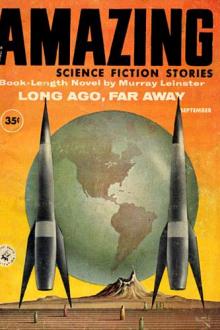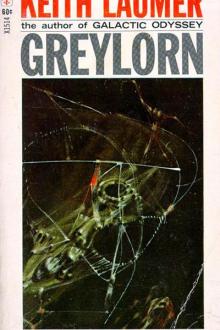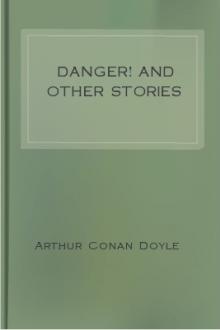Genre Science Fiction. Page - 7

y rankling in my heart, picked my way homeward by a short cut through the dismalness of a New York slum I longed for steak and stout, slippers and a pipe, with all the pathetic keenness of a troubled soul.
It was a wild, black kind of night, and the weirdness of it showed up as I passed from light to light or crossed the mouths of dim alleys leading Heaven knows to what infernal dens of mystery and crime even in this latter-day city of ours. The moon was up as far as the church steeples; large vapoury clouds scudding across the sky between us and her, and a strong, gusty wind, laden with big raindrops snarled angrily round corners and sighed in the parapets like strange voices talking about things not of human interest.
It made no difference to me, of course. New York in this year of grace is not the place for the supernatural be the time never so fit for witch-riding and the night wind in the chimney-stacks sound never so much like the last gurgling cries of throttled men. No! the world was ver

"But, Rod, I've been waiting to hear what he's found out ever since he went away," Fawzi protested in a hurt tone.
Brangwyn and Colonel Zareff joined them. They were close friends, probably because neither of them was a native of Poictesme.
The town marshal had always been reticent about his origins, but Conn guessed it was Hathor. Brangwyn's heavy-muscled body, and his ease and grace in handling it, marked him as a man of a high-gravity planet. Besides, Hathor had a permanent cloud-envelope, and Tom Brangwyn's skin had turned boiled-lobster red under the dim orange sunlight of Alpha Gartner.
Old Klem Zareff never hesitated to tell anybody where he came from--he was from Ashmodai, one of the System States planets, and he had commanded a division that had been blasted down to about regimental strength, in the Alliance army.
"Hello, boy," he croaked, extending a trembling hand. "Glad you're home. We all missed you."
"We sure did, Conn," the town marshal agreed, clasping Conn's

ou so desire. But take your spears and go."
She crossed to the little knoll and picked up the spears. She held one out to him, the one that bore the emerald point.
"This," she said, "to remember--Suarra."
"No," he thrust it back. "Go!"
If the others saw that jewel, never, he knew, would he be able to start them on the back trail--if they could find it. Starrett had seen it, of course, but he might be able to convince them that Starrett's story was only a drunken dream.
The girl studied him--a quickened interest in her eyes.
She slipped the bracelets from her arms, held them out to him with the three spears.
"Will you take these--and leave your comrades?" she asked. "Here are gold and gems. They are treasure. They are what you have been seeking. Take them. Take them and go, leaving that man here. Consent--and I will show you a way out of this forbidden land."
Graydon hesitated. The emerald alone was worth a fortune. What loyalty did he owe the three, afte

't," said Edwards.
"You're on," said Carter.
"Let me in," suggested Ives.
"And I'll take one of it," said McGuire.
"Come one, come all," said Edwards cheerily. "I'll live high on the collective bad judgment of this outfit."
"To-night isn't likely to settle it, anyhow," said Ives. "I move we turn in."
Expectant minds do not lend themselves to sound slumber. All night the officers of the Wolverine slept on the verge of waking, but it was not until dawn that the cry of "Sail-ho!" sent them all hurrying to their clothes. Ordinarily officers of the U.S. Navy do not scuttle on deck like a crowd of curious schoolgirls, but all hands had been keyed to a high pitch over the elusive light, and the bet with Edwards now served as an excuse for the betrayal of unusual eagerness. Hence the quarter-deck was soon alive with men who were wont to be deep in dreams at that hour.
They found Carter, whose watch on deck it was, reprimanding the lookout.
"No, sir," th

to a low birth rate. Now, supplied with great quantities of iron by their unremitting industry, they were moved to prodigies of multiplication.
The chairman of the Dail Committee on the Condition of the Planet Eire had spoken of them scornfully as equal to mice. They were much worse. The planetary government needed at least a pied piper or two, but it tried other measures. It imported cats. Descendants of the felines of Earth still survived, but one had only to look at their frustrated, neurotic expressions to know that they were failures. The government set traps. The dinies ate their springs and metal parts. It offered bounties for dead dinies. But the supply of dinies was inexhaustible, and the supply of money was not. It had to be stopped.
Then upon the spaceport of Eire a certain Captain Patrick Brannicut, of Boston, Earth, descended. It was his second visit to Eire. On the first he'd learned of the trouble. On his second he brought what still seemed the most probable solution. He landed ei

ding. Speaking into an audioscriber, a machine that transmitted his spoken words into typescript, he repeated the names of the candidates as they passed.
"Cadet Candidate Tom Corbett," announced Tom, and Herbert repeated it into the audioscriber.
"Cadet Candidate Astro!" The big Venusian stepped forward.
"What's the rest of it, Mister?" inquired Herbert.
"That's all. Just Astro."
"No other names?"
"No, sir," replied Astro. "You see--"
"You don't say 'sir' to a senior cadet, Mister. And we're not interested in why you have only one name!" Herbert snapped.
"Yes, sir--uhh--Mister." Astro flushed and joined Tom.
"Cadet Candidate Philip Morgan," announced the next boy.
Herbert repeated the name into the machine, then announced, "Cadet Candidates Tom Corbett, Astro, and Philip Morgan assigned to Section 42-D."
Turning to the three boys, he indicated the spiraling slidestairs. "Forty-second floor. You'll find Section D in the starboard wing

magining that, I'm right there with you."
He went back to the main building to get Gail and Captain Moggs. They went out to the 'copter hangar together.
"I've talked to the radar and loran operator," said Soames. "I explained that you wanted to see some crevasses from the air, and I'd be wandering around looking for them on the way to the rookery. He will check on us every fifteen minutes, anyhow."
* * * * *
The 'copter went up the long, sloping, bulldozed snow-ramp. Soames checked his radio contact. He nodded. The engines hummed and roared and bellowed, and the ship lifted deliberately and floated away over the icy waste.
The little helicopter was very much alone above a landscape which had never known a growing thing.
Soames kept in radar contact and when he was ready he told the base, "I'm going down now, hunting crevasses."
He let the 'copter descend. The waste was featureless, then and for a seemingly interminable time afterward. Then his estimated positio

a few weeks before, but the idea had spread through the crew like wildfire. Now, I couldn't afford drastic action, or risk forcing a blowup by arresting ringleaders. I had to baby the situation along with an easy hand and hope for good news from the Survey Section. A likely find now would save us.
There was still every reason to hope for success in our search. To date all had gone according to plan. We had followed the route of Omega as far as it had been charted, and then gone on, studying the stars ahead for evidence of planets. We had made our first finds early in the fourth year of the voyage. It had been a long tedious time since then of study and observation, eliminating one world after another as too massive, too cold, too close to a blazing primary, too small to hold an atmosphere. In all we had discovered twelve planets, of four suns. Only one had looked good enough for close observation. We had moved in to televideo range before realizing it was an all-sea world.
Now we had five new m

ed. We were at war.
There was no craft near us, and our surface speed is nearly twice that of our submerged, so I blew out the tanks and our whale-back came over the surface. All night we were steering south-west, making an average of eighteen knots. At about five in the morning, as I stood alone upon my tiny bridge, I saw, low down in the west, the scattered lights of the Norfolk coast. "Ah, Johnny, Johnny Bull," I said, as I looked at them, "you are going to have your lesson, and I am to be your master. It is I who have been chosen to teach you that one cannot live under artificial conditions and yet act as if they were natural ones. More foresight, Johnny, and less party politics--that is my lesson to you." And then I had a wave of pity, too, when I thought of those vast droves of helpless people, Yorkshire miners, Lancashire spinners, Birmingham metal-workers, the dockers and workers of London, over whose little homes I would bring the shadow of starvation. I seemed to see all those wasted eager ha

stro, turning red with embarrassment, "we're going to Venus."
"What's so unusual about going to Venus?" asked Strong.
"We're going hunting," replied Astro.
"Hunting?"
"Yes, sir," gulped the big Venusian. "For tyrannosaurus."
Strong's jaw dropped and he sat down suddenly on the nearest acceleration cushion. "I expected something a little strange from you three whiz kids." He laughed. "It would be impossible for you to go home and relax for a month. But this blasts me! Hunting for a tyrannosaurus! What are you going to do with it after you catch it?" He paused and then added, "If you do."
"Eat it," said Astro simply. "Tyrannosaurus steak is delicious!"
Strong doubled with laughter at the seriousness of Astro's expression. The giant Venusian continued doggedly, "And besides, there's a bounty on them. A thousand credits for every tyranno head brought in. They're dangerous and destroy a lot of crops."
Strong straightened up. "All right, all right! Go ahead! H